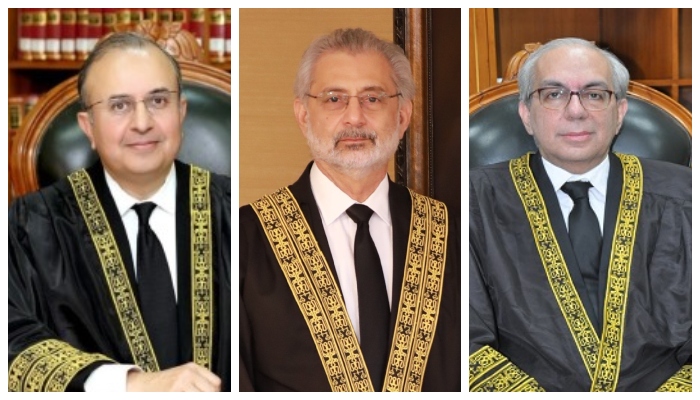Supreme Court judges at odds over fixing review pleas against reserved seats' verdict
Majority of the committee members decide to fix hearing’s date after summer vacations
July 21, 2024

- It'll be injustice if pleas not fixed for hearing now: CJ Isa.
- Petitions to become "redundant", if hearing is delayed, he says.
- "Constitutional right" should be preferred, chief justice adds.
ISLAMABAD: The top three judges of the Supreme Court are at odds over fixing review petitions, against the apex court's verdict on reserved seats in the national and provincial assemblies, for hearing.
The News reported on Sunday that Chief Justice of Pakistan (CJP) Qazi Faez Isa was at loggerheads with Justice Syed Mansoor Ali Shah and Justice Munib Akhtar over fixing the review petitions for hearing as the former wants it to be immediately fixed, while the latter wanted it to be heard after summer vacations, when the detailed ruling is released.
CJP Isa said that it would be an injustice if the pleas were not fixed for hearing now. While, Justice Mansoor and Justice Munib believed that it could be fixed only after detailed verdict on the July 12 ruling was released by the 13-member bench.
During the 17th meeting of the committee constituted under Section 2 of the Supreme Court (Practice and Procedure) Act 2023 held on July 18, both the senior judges of the apex court opposed the idea.
Justice Munib participated in the meeting through a video link, as he is on vacation.
The majority of the committee members decided to fix the hearing’s date after summer vacations, when the complete bench that announced the judgement would be available.
The committee secretary pointed out that in two urgent applications that were filed with the review petitions, the petitioners said that the order under review had set a deadline of 15 days, and if that order was executed, the petitions would already become redundant.
Under order XXVI, Rule 8 of the Supreme Court Rules 1980, Justices Mansoor and Munib made the following observations that the review petitions could only be scheduled before the bench that heard the case initially and given that the court is in the midst of its summer vacation and that the majority of its judges are either abroad or on vacation, hence, it would be suitable if the matter was fixed after the vacations.
“Additionally, it was also pointed out that the review petitions are not fixed until detailed judgement is released by the bench and in this case the detailed judgement is still awaited,” read the minutes of the meeting.
Chief Justice Isa, nevertheless, urged that the right of review had been provided under the Constitution and such right had to be preferred over the judges’ convenience.
“Also, as the judges had taken oath to abide by the Constitution, it would be unjust and unfair if the review petitions were not fixed urgently,” the chief justice told the committee, emphasising that the order under review required reopening of the court even if it required cancellation of vacations.
In response, Justice Munib commented that summer vacations were provided under Order II of the Rules. Rule 3 of the said Order which provides that the judicial year of the Court shall commence on the second Monday in September each year and continue until the commencement of the vacation in the year next following.
Justice Munib said that Rule 4 provides that summer vacation of the Court shall commence on June 15 or on such date as may be fixed in each year by the CJ and notified in the gazette.
The judge pointed out that the chief justice through a notification dated June 4, 2024, extended the date of commencement of summer vacations as July 15, 2024, however, there is no provision in the said order for cancellation of the summer vacations once the same have been announced unless the matter is put up before the full court and the rules are amended accordingly.
“Hence, cancellation of vacation cannot be recoursed to by the committee or the chief justice,” the judge further told the body.
Meanwhile, the committee considered and approved the court rosters during summer vacations from July 29 to September 6.
Meanwhile, CJP Isa said that the minutes of the meeting have been written by his colleagues with whom in respect of agenda items 1 and 3, he cannot agree and has written his separate note.
PML-N files review petition
The Pakistan Muslim League-Nawaz (PML-N) on July 15 filed a review petition in the Supreme Court against reserved seats verdict that declared the Pakistan Tehreek-e-Insaf (PTI) eligible for the reserved seats for minorities and women.
The ruling party has nominated 11 respondents in the plea including the Sunni Ittehad Council (SIC) and its chairman Hamid Raza, praying the court to suspend its ruling dated July 12, 2024, on the reserved seats.
The petitioner claimed the apex court’s verdict was silent on some points.
The review petition asked a number of questions including whether the SIC should be granted the reserved seats.
It questioned if reserved seats could be granted to a political party who had not submitted a party list within the prescribed time, whether a political party can be given reserved seats whose candidates have not even filed nomination papers within the time provided by the Election Commission of Pakistan and if independents could even join a political party which did not win a single general seat in parliament.
The plea also raised question if the seats could be left vacant or have to be distributed amongst the political parties contesting for the said seats.
The petition has been filed in response the apex court’s July 12 ruling, that declared the PTI eligible for the allocation of reserved seats.
The decision not only paved the way for the PTI's return to the parliament, which was kicked out of the February 8 polls owing to the ECP's December 2023 ruling, but has also increased the pressure on the coalition alliance by changing the composition of the National Assembly.
The 8-5 majority verdict declared that the lack or denial of an election symbol does not in any manner affect the constitutional or legal rights of a political party to participate in an election, whether general or by, and to field candidates and that the commission is under a constitutional duty to apply all statutory provisions accordingly.









